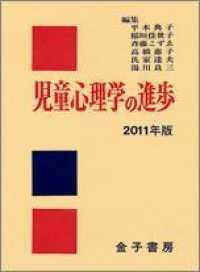基本説明
Introduces a talent development approach to educational assessment as a counter to prevailing philosophies.
Full Description
The second edition of Assessment for Excellence arrives as higher education enters a new era of the accountability movement. In the face of mandates such as results-based funding and outcomes-based accreditation, institutions and assessment specialists are feeling increasingly pressured to demonstrate accountability to external constituencies. The practice of assessment under these new accountability pressures takes on special significance for the education of students and the development of talent across the entire higher education system. This book introduces a talent development approach to educational assessment as a counter to prevailing philosophies, illustrating how contemporary practices are unable to provide institutions with meaningful data with which to improve educational outcomes. It provides administrators, policymakers, researchers, and analysts with a comprehensive framework for developing new assessment programs to promote talent development and for scrutinizing existing policies and practices. Written for a wide audience, the book enables the lay reader to quickly grasp the imperatives of a properly-designed assessment program, and also to gain adequate statistical understanding necessary for examining current or planned assessment policies. More advanced readers will appreciate the technical appendix for assistance in conducting statistical analyses that align with a talent development approach. In addition, institutional researchers will benefit from sections that outline the development of appropriate student databases.
Contents
Preface
Chapter 1: The Philosophy and Logic of Assessment
Chapter 2: A Conceptual Model for Assessment
Chapter 3: Assessing Outcomes
Chapter 4: Assessing Student Inputs
Chapter 5: Assessing the Environment
Chapter 6: Analyzing Assessment Data
Chapter 7: Use of Assessment Results
Chapter 8: Building a Database
Chapter 9: Assessment as Direct Feedback to the Learner
Chapter 10: Assessment and Equity
Chapter 11: Assessment and Public Policy
Chapter 12: The Future of Assessment
Appendix: Statistical Analysis of Longitudinal Data
References
Index







